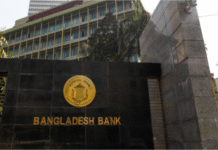Analysts say smartphones, 3G to fuel e-commerce growth
 Analysts take part in a roundtable on e-commerce, jointly organised by Bangladesh Association of Software and Information Services and The Daily Star at the newspaper’s office in Dhaka yesterday.
Analysts take part in a roundtable on e-commerce, jointly organised by Bangladesh Association of Software and Information Services and The Daily Star at the newspaper’s office in Dhaka yesterday. The volume of e-commerce business will get bigger in near future as the use of smartphones marked a rise in recent times, while the much-talked-about 3G technology is just in the offing, analysts said yesterday.
But they said higher transaction fees and a lack of security may discourage customers from using the e-payment methods.
Prof Jamilur Reza Choudhury, vice chancellor of University of Asia-Pacific, said banks take 3 percent transaction fees for every online purchase, which is high and will discourage people.
The use of smart devices is growing fast in Bangladesh and people will be able to use them for online payment once the private operators launch 3G mobile technology, he said.
Choudhury spoke at a round-table on “e-commerce in Bangladesh: how ready we are”, jointly organised by Bangladesh Association of Software and Information Services and The Daily Star, as part of the ongoing e-commerce week, at the newspaper’s office in Dhaka.
Choudhury moderated the discussion.
Abul Kashem Md Shirin, deputy managing director of Dutch-Bangla Bank, said people use the e-payment methods for paying utility bills or tuition fees and purchasing train tickets, but it is frustrating in terms of purchasing goods.
Yeafesh Osman, state minister for science and technology, and Amir Khasru Mahmud Chowdhury, a BNP leader and former minister, committed that they would try to collect annual party contribution online from the party members.
Osman said the government wants the development of the ICT sector with the assistance from all stakeholders.
He said all banks will have to introduce mobile banking services to stay afloat.
The spirits of ‘Digital Bangladesh’ should not be ignored with the change in government in future, Osman said.
BNP leader Chowdhury said ICT is the most potential sector as its stakeholders are young and enthusiastic.
He also suggested the introduction of debit cards to give a boost to the e-commerce business.
Mahfuz Anam, editor and publisher of The Daily Star, said the country is witnessing changes in different areas, especially in the ICT, but not in political culture.
The country has been in the same political culture for the last 22 years and no modernisation is seen, he said.
“People have become very concerned about their future,” he said.
Nazrul Islam Khan, ICT secretary, said the ministry will form a committee to address the challenges of e-commerce.
Campaigns are needed at the district levels to introduce e-commerce in a bigger way, he said.
He also said, if the electronic transaction fees are brought down, more people will use the system.
Bangladesh has more internet-enabled mobile devices and connectivity than that was in the US in 1990s; so it is time to see why electronic payment is not flourishing here, said Kamal Qudir, CEO of bKash, a subsidiary of BRAC Bank.
There is a need for an authority that will authenticate e-commerce portals, said Tapan Kanti Sarkar, president of CTO Forum, an association of banks’ chief technology officers.
Anir Chowdhury, policy adviser to Access to Information programme of the Prime Minister’s Office, said, “We should encourage more mobile financial services for e-commerce than credit cards.”
Russell T Ahmed, secretary general of BASIS, said one fraudulent incident like the Hall-Mark scam is enough to destroy the entire efforts of the e-commerce initiative.
“So, all will have to be very cautious about security.”
Zakaria Swapan, CEO of online news portal priyo.com, said the government can offer tax breaks to encourage online payment, which the US did in 1990s.
BASIS President AKM Fahim Mashroor said the trade body will prepare recommendations on the basis of the outcomes of the e-commerce week and put forward those to the central bank, the ICT ministry and other organisations.
Shameem Ahsan, senior vice president of BASIS, and Fida Haq, managing director of e-commerce firm Shurjomukhi, also spoke.
Source: The Daily Star









